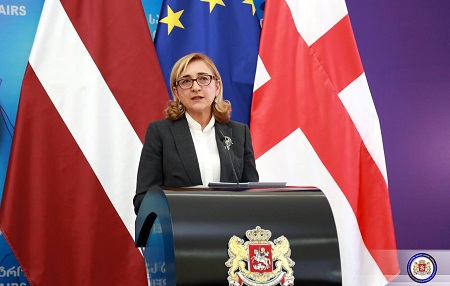Georgia’s Foreign Minister sums up OSCE Ministerial

Georgia’s Foreign Minister Tamar Beruchashvili has summed up Georgia’s presence at this week's OSCE Ministerial in Switzerland and emphasized several Georgia-related issues she brought up at the event.
She noted she had held up to 20 meetings during the December 4-5 event, where the Russia-breakaway Abkhazia deal on 'Alliance and Strategic Partnership' was widely discussed.
"Georgia’s address at the OSCE Plenary Session before 57 participant countries was dedicated to speaking about all the challenges and priorities Georgia is currently facing," the Minister said.
"First of all my speech touched upon the Russian-Abkhazian treaty that creates threats for regional security. The second issue was regarding the importance of the Geneva Talks and the international community’s support for Russia to accept non use of force to Georgia.
"The third topic pushed forward by us concerned the poor situation in terms of human rights on the occupied regions of Georgia,” Beruchashvili said, adding that the aim of the current Government was to raise global awareness and involve the international community in Georgia-Russia conflict related issues.
Beruchashvili stated she held a separate meeting with co-chairs of the Geneva Talks (The Geneva International Discussions were established to address the consequences of the 2008 conflict in Georgia). "The meeting was especially important as the next meeting of the talks is scheduled on December 10,” she said.
Beruchashvili said the OCSE leadership made special statements concerning the conflict in Georgia and explained the reasons why the Council of Ministers of the OSCE failed to issue a declaration on the situation in Georgia’s occupied regions.
"They explained it was because of principles and fundamental differences with Russia. For adoption of such a declaration required the whole consensus, meaning the approval of Russia as well. However, the process of discussing such a document revealed large-scaled support of OSCE member countries to Georgia,” she said.
The OSCE Ministerial, held annually, provides foreign ministers and more than 70 delegations of OSCE participating states, partner countries and several international organisations an opportunity to review and assess the organisation's activities during the past year and offer national viewpoints on security matters.
 Tweet
Tweet  Share
Share